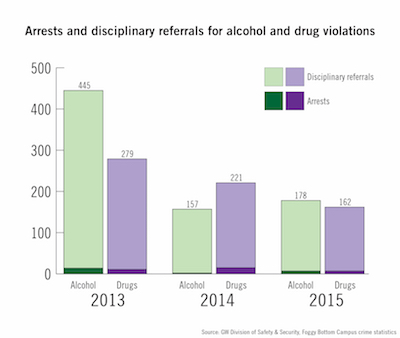Fewer students were arrested or referred to GW’s disciplinary action office last year for drug violations – a trend the University Police Department Chief attributes to students’ increased awareness about the dangers of drugs and alcohol.
Arrests and disciplinary referrals for drug violations have decreased for the second consecutive year, according to data from GW’s annual security report released last week. There were six drug arrests on the Foggy Bottom Campus in 2015, compared to 11 the year before. Referrals for drug violations last year declined by about a quarter, according to the report.

Overall, alcohol violations increased by about 9 percent on the Foggy Bottom Campus last year compared to 2014, according to the report.
UPD Chief RaShall Brackney said officials have not made any changes to University policies on drugs and alcohol on campus. The University follows local and federal laws, she added.
She said students are learning more about drugs and alcohol and that Health Promotion and Promotion Services hosts events that focus on educating students about the substances. HPPS has shifted its focus to provide more overall health services and increase outreach efforts, instead of solely focusing on alcohol and drug awareness.
“As a campus and as a society, we are becoming a more responsible in a lot of ways, and students have an increased understanding of the impacts of drugs and alcohol,” she said.
Alcohol violations on the Foggy Bottom Campus increased between 2014 and 2015: Arrests for the violations increased from one to six arrests in 2015, and there has been a 9 percent increase in the number of students who are referred to the Office of Student Rights and Responsibilities, according to the report.
On the Mount Vernon Campus, the number of students referred for disciplinary action increased slightly from 19 to 21 referrals last year, according to the report. The number of referrals for alcohol on the Vern increased from six to eight incidents in that period. There were no arrests for drugs or alcohol on the Vern during any of the three years included in the report.
At the Hampton Roads Center – the first year the campus is individually included in the security report – there was one arrest for alcohol on the campus, which was reported to the local police in Hanover County, Va.
Between 2013 and 2014, the number of students who were referred for disciplinary action for drugs and alcohol declined by 50 percent. Officials said at the time that the drop was due in part to routine searches no longer referring as many students to SRR.
Marijuana arrests in D.C. dropped by about 99 percent by the end of 2015 – just about a year after the drug was decriminalized in the city. The relatively new laws did not change GW’s ban on marijuana on campus or in residence halls.
The decrease in alcohol and drug reports could be caused by a variety of factors, Matthew Malhiot, a consultant for Forensic Alcohol Consulting and Training, said. He added that the two main indicators to ensure safety are public education and deterrence.
“Arrests aren’t always a good indicator because it doesn’t tell you if police changed their enforcement efforts or students changed their behavior,” Malhiot said.
David Bosquet, the campus police chief of Becker College and the incoming president of the International Association of Campus Law Enforcement Agencies, said the number of alcohol and drug citations on a campus can be caused by “a multitude of different things and factors.”
He added that every police chief has a different strategy on how to deal with students’ drug and alcohol use.
“For a police chief, it’s a constant assessment of where you are,” Bosquet said. “Obviously, we hit hard with public education and can concentrate patrol areas.”







